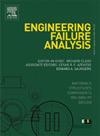Influence of milling stability on machined surface integrity and fatigue performance of Ti-6Al-4V titanium alloy
IF 4.4
2区 工程技术
Q1 ENGINEERING, MECHANICAL
引用次数: 0
Abstract
Chatter is a deciding factor in milling operations regarding surface integrity and production efficiency. The purpose of this experimental research is to systematically investigate the influence of milling stability on machined surface integrity and fatigue performance of Ti-6Al-4V alloy samples. The surface integrity parameters like roughness, plastic deformation, microhardness, and residual stress were used to evaluate the machined surface quality. The fatigue tests were performed at five tensile stress levels with samples machined under stable, critical stable and unstable (chatter) cutting conditions. The experimental findings show that in comparison with samples produced by stable milling, the machined surface integrity parameters get worse with the increase of chatter amplitude and chatter marks, while fatigue test results show that the average fatigue life of these samples also decreases by about 20 %. The fatigue fracture morphology underscored that multiple fatigue cracks are initiated from the chatter marks on the machined surface. The experimental results provide a quantitative relation between the occurrence of chatter in milling operations and the life expectancy of the corresponding machined parts.
求助全文
约1分钟内获得全文
求助全文
来源期刊

Engineering Failure Analysis
工程技术-材料科学:表征与测试
CiteScore
7.70
自引率
20.00%
发文量
956
审稿时长
47 days
期刊介绍:
Engineering Failure Analysis publishes research papers describing the analysis of engineering failures and related studies.
Papers relating to the structure, properties and behaviour of engineering materials are encouraged, particularly those which also involve the detailed application of materials parameters to problems in engineering structures, components and design. In addition to the area of materials engineering, the interacting fields of mechanical, manufacturing, aeronautical, civil, chemical, corrosion and design engineering are considered relevant. Activity should be directed at analysing engineering failures and carrying out research to help reduce the incidences of failures and to extend the operating horizons of engineering materials.
Emphasis is placed on the mechanical properties of materials and their behaviour when influenced by structure, process and environment. Metallic, polymeric, ceramic and natural materials are all included and the application of these materials to real engineering situations should be emphasised. The use of a case-study based approach is also encouraged.
Engineering Failure Analysis provides essential reference material and critical feedback into the design process thereby contributing to the prevention of engineering failures in the future. All submissions will be subject to peer review from leading experts in the field.
 求助内容:
求助内容: 应助结果提醒方式:
应助结果提醒方式:


